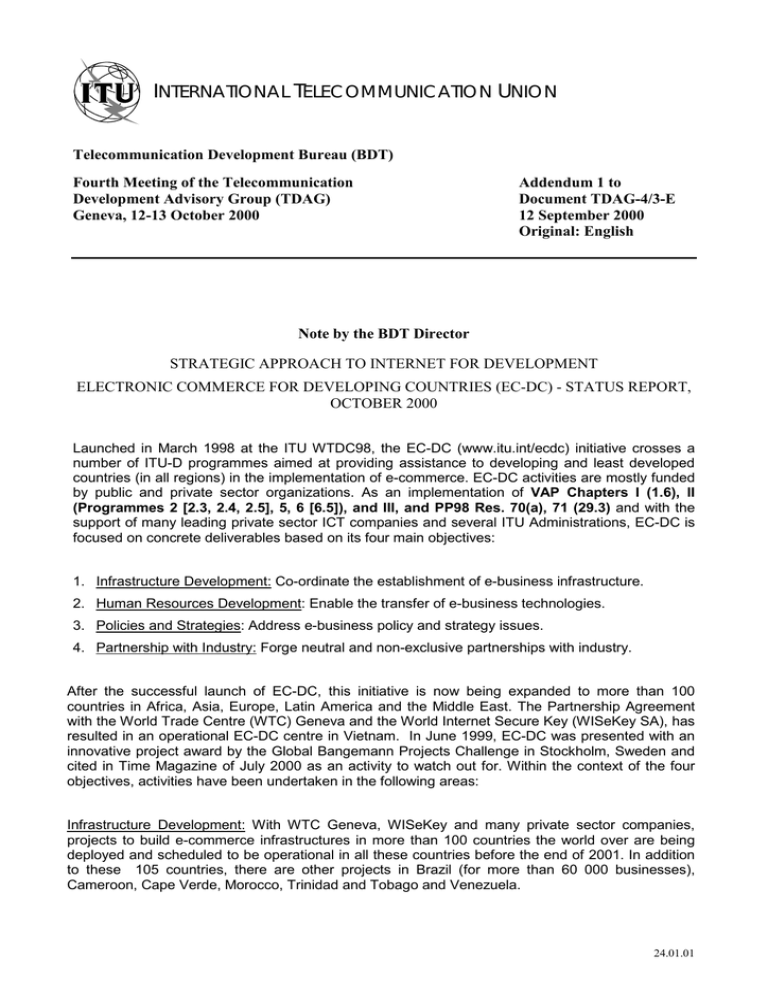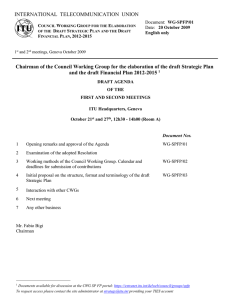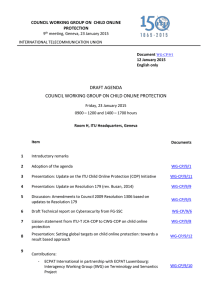I T U NTERNATIONAL
advertisement

INTERNATIONAL TELECOMMUNICATION UNION Telecommunication Development Bureau (BDT) Fourth Meeting of the Telecommunication Development Advisory Group (TDAG) Geneva, 12-13 October 2000 Addendum 1 to Document TDAG-4/3-E 12 September 2000 Original: English Note by the BDT Director STRATEGIC APPROACH TO INTERNET FOR DEVELOPMENT ELECTRONIC COMMERCE FOR DEVELOPING COUNTRIES (EC-DC) - STATUS REPORT, OCTOBER 2000 Launched in March 1998 at the ITU WTDC98, the EC-DC (www.itu.int/ecdc) initiative crosses a number of ITU-D programmes aimed at providing assistance to developing and least developed countries (in all regions) in the implementation of e-commerce. EC-DC activities are mostly funded by public and private sector organizations. As an implementation of VAP Chapters I (1.6), II (Programmes 2 [2.3, 2.4, 2.5], 5, 6 [6.5]), and III, and PP98 Res. 70(a), 71 (29.3) and with the support of many leading private sector ICT companies and several ITU Administrations, EC-DC is focused on concrete deliverables based on its four main objectives: 1. Infrastructure Development: Co-ordinate the establishment of e-business infrastructure. 2. Human Resources Development: Enable the transfer of e-business technologies. 3. Policies and Strategies: Address e-business policy and strategy issues. 4. Partnership with Industry: Forge neutral and non-exclusive partnerships with industry. After the successful launch of EC-DC, this initiative is now being expanded to more than 100 countries in Africa, Asia, Europe, Latin America and the Middle East. The Partnership Agreement with the World Trade Centre (WTC) Geneva and the World Internet Secure Key (WISeKey SA), has resulted in an operational EC-DC centre in Vietnam. In June 1999, EC-DC was presented with an innovative project award by the Global Bangemann Projects Challenge in Stockholm, Sweden and cited in Time Magazine of July 2000 as an activity to watch out for. Within the context of the four objectives, activities have been undertaken in the following areas: Infrastructure Development: With WTC Geneva, WISeKey and many private sector companies, projects to build e-commerce infrastructures in more than 100 countries the world over are being deployed and scheduled to be operational in all these countries before the end of 2001. In addition to these 105 countries, there are other projects in Brazil (for more than 60 000 businesses), Cameroon, Cape Verde, Morocco, Trinidad and Tobago and Venezuela. 24.01.01 -2– TDAG-4/3 (Add.1) Gender Equality: The BDT is providing technical and financial assistance (CHF 100,000) to a 3500member association of women entrepreneurs (ASAFE) representing several countries. With the financial support of the Government of Japan, this project empowers women entrepreneurs as active players in the digital economy. Other activities include a Women's Cyberforum in Cameroon and a joint ITU/UNIFEM forum at the UN in New York for women from all regions of the world. Assistance to Least Developed Countries (LDCs): More than 20 LDCs from all regions (out of a total of 48) are benefiting from technical assistance provided by the BDT and industry partners in establishing e-commerce infrastructure in these countries. The BDT has actively participated in various workshops and seminars with particular emphasis on assisting LDCs in setting up their ecommerce endeavours. As an example, the BDT is assisted the Nigerian Regulatory Agency to organize an e-commerce workshop in September 2000 for the Afrinet2000 Internet Summit. A workshop for the Asian sub-region (Vietnam, Lao P.D.R and Cambodia) took place on the 3-5 October 2000. Human Resources Development: Within the HRD framework, training workshops have been organized in Latin America, notably in Chile, Venezuela and in Brazil, as well as in Cameroon, Mali, Malaysia and the United Arab Emirates. A training workshop for participants from 100 developing countries, to be sponsored by industry partners, is scheduled for 27-29 November 2000 at the ITU, Geneva. More than 27 courses and seminars on ICT have been given in the centre for training and development created in Venezuela as a result of the MoU with FUNDANDINA, Venezuela. Policies and Strategies: Presentations have taken place in Africa (Bamako 2000), Asia (CTO conference in Malaysia), United States (AFCOM99), Latin America (ITU TELECOM Americas 2000), Middle East (ITU Regional Development Seminar, Egypt), in Geneva IIR Conference, Afrinet2000 in Nigeria, AMS/ICC E-business conference in the Sultanate of Oman, and in many other locations. A conference for the Arab States region is planned for November 2000 in the United Arab Emirates. Other events addressing e-commerce policy and strategies are scheduled for other regions. Partnership and Financing: Agreements have been signed with FUNDANDINA in Venezuela, the WTC Geneva and WISeKey SA, also in Geneva. To date, industry partners have contributed more than USD 7 million in in-kind contributions to the EC-DC project. Very successful private sector meetings took place on 15 June 2000, September 14 and 10 October 2000 to increase the participation of the private sector in EC-DC. The solutions developed as a result of these meetings were presented on 14 September and 10 October 2000 in Geneva. From the end of October 2000, these solutions will be provided free to developing and least developed countries that are ITU Member States. 24.01.01 -3– TDAG-4/3 (Add.1) List of Countries: Today, EC-DC is being deployed in the following 105 countries (a total of 205 organizations including telecom operators, Ministries, Chambers of Commerce, Internet Service Providers and financial institutions) from Africa, Asia, Europe, Latin America and the Middle East. REGIONS EUROPE & CIS Australia Belarus Bangladesh Bosnia Bhutan Herzegovin Brunei Darussalam a Cambodia Bulgaria China (People’s Rep. Croatia Cyprus Of) Fiji Czech India Republic Iran France Korea (Rep. of) Georgia Malaysia Greece Maldives Hungary Mongolia Italy Nepal Malta New Zealand Monaco Pakistan Portugal Philippines Kyrgyz Samoa (Independent Republic Romania State Of) Singapore Russia Sri Lanka Slovakia Thailand Slovenia Vanuatu Spain Vietnam Switzerland Turkey Ukraine AFRICA THE AMERICAS ARAB STATES ASIA & PACIFIC Burkina Faso Burundi Cameroon Cape Verde Central African Republic Cote d’Ivoire Eritrea Ethiopia Gabon Ghana Guinea Guinea-Bissau Malawi Mali Mauritania Mauritius Mozambique Namibia Niger Nigeria Senegal Seychelles South Africa Tanzania Uganda Zimbabwe Argentina Bahamas Bolivia Brazil Canada Chile Colombia Costa Rica Cuba Dominica (Commonwealth of) Dominican Rep. Ecuador Guatemala Honduras Jamaica Mexico Panama Peru Saint-Lucia St. Vincent & The Grenadines Trinidad & Tobago Uruguay USA Venezuela Bahrain Egypt Jordan Lebanon Morocco Palestinian Authority** Qatar Syria Tunisia United Arab Emirates 24.01.01


